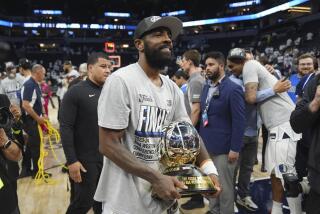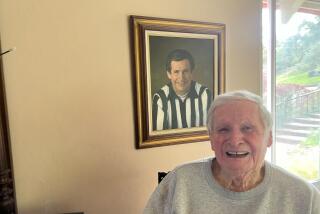Irvin Cowboy : He Was Landry’s Last First-Round Pick and Choicest of a New Generation
- Share via
IRVING, Tex. — Michael Irvin was the life of the party here when the music was silenced and the lights were turned off.
He was the style of the Dallas Cowboys before they got stylish again. He was the walking, squawking, finger-pointing herald of a new era of Cowboy football, the loud vanguard during those quiet years after the mid-’80s.
“My greatest asset,” he once said, “is my ego.”
Irvin was drafted in 1988 from Jimmy Johnson’s swaggering 1987 national championship University of Miami team by Tom Landry and Tex Schramm, traditional men who loved his game-breaking talents as a receiver. They were not enraptured by his talking and fist pumping.
But he was the future of the Cowboys, and they were about to become the past.
A year after Irvin had become a Cowboy, Landry and Schramm were swept out of power by new owner Jerry Jones, who immediately installed Johnson as the coach and chief football man. And Irvin was home again.
Four years later, as Irvin will readily inform you, at the ripe old age of 26, he is the one player who can best appreciate what is happening now. He witnessed the dramatic fall of Landry and Schramm, who together had come to define the Cowboys, and experienced the team’s 4-28 record from Landry’s final season through Johnson’s first in 1989.
This week, at their Valley Ranch complex, the Cowboys are preparing for their first Super Bowl appearance in 14 years, and Irvin knows what it means.
“Four years ago I said, ‘You know, one thing about being in purgatory, when you get to heaven, it’s going to make it all the sweeter,’ ” Irvin said here Thursday. “I think the Super Bowl’s as close as you can get to heaven.”
Next Sunday’s game in the Rose Bowl against the Buffalo Bills, Irvin says, makes everything worthwhile--the losing, his devastating knee injury and slow recovery in 1989, the criticism heaped on Johnson when he began to tear apart everything Landry had put together.
Irvin, the last first-round pick of the old regime and the first important player of the new, is the one Cowboy star who predates the arrival of Johnson, Troy Aikman, Emmitt Smith, Tony Casillas and all the others who have raised the Cowboys back up from the depths.
These new, successful, sassy Cowboys date back to his arrival.
“Yeah, I think about it all the time,” Irvin said. “I think about the downs, the 1-15 (season in 1989), the 3-13 season (in ‘88, Landry’s last). . . . When we were going through 1-15, I was laying up in a hospital and people were doubting if I’d ever play a game again.
“And now I say, ‘Man, I’ve come full circle, we’ve come full circle, and it’s nice.’
“If God told me, ‘Michael, come back over here, we’re going to start over, we’re going to run the race all over,’ I’d run the race exactly the way I ran it this time.
“I don’t have any regrets. I’m a happy man, a young man, a married man, a rich man . . . and I’m playing in the Super Bowl. What more do I want?”
After winning the NFC title last Sunday over the San Francisco 49ers, he told reporters: “If we win one more game, the man upstairs, he can call me home. I’ve served my purpose here.”
In the middle of his recuperation from a severe ligament injury in his right knee in 1989, Irvin concedes he had doubts himself whether he could ever come back as an NFL game-breaker, whether he could live up to his favorite nickname, “Playmaker.”
He did not return until the fifth game of 1990 and caught only 20 passes that season. For a while, his fervent belief in his ability to do great things flickered.
This is the same player who, on the day he was drafted, turned to the TV cameras and said, “Go tell (veteran Cowboy quarterback) Danny White I’m going to put him in the Pro Bowl.” That didn’t quite happen and White was gone by 1989, but in a franchise known for Landry’s stolidity and Schramm’s imperial style, Irvin stood out.
“He is, without a doubt, the most confident person in his own abilities I’ve ever seen in my life,” backup quarterback Steve Beuerlein said.
“There’s nobody that has more confidence in themselves than he does, which is what I think makes him so great.”
Heading into 1991, Irvin knew he was facing a pivotal time for both himself and the Cowboys. It was the third year of Johnson’s rebuilding program and the team hadn’t yet had a winning season, and despite having a strong-armed young quarterback in Aikman, Irvin wasn’t close to being a Pro Bowl candidate.
But that off-season, Johnson hired Norv Turner, formerly the Rams’ receiver coach, as Dallas’ offensive coordinator, and a couple of early talks with Turner seemed to rejuvenate Irvin.
“When I came in here, I came in here assuming he was the player he was at Miami,” Turner said this week.
So Turner built the new quick-strike passing game around Irvin’s ability. Responding to that challenge, Irvin set single-season Cowboy records in 1991 for receptions, 93; yards receiving, 1,523, and 100-yard receiving games, seven.
When Aikman or Beuerlein, filling in when Aikman was hurt last season, needed critical yards, Turner turned to the 6-foot-2 Irvin to make the catch.
“He thrives on it,” Turner said. “He expects to make it happen, and he’s disappointed if he’s not the one you’re calling on to make it happen.”
This year, Irvin caught 78 passes for 1,396 yards--the second-highest yardage total in Cowboy history after his 1991 performance--and wanted more.
“I’m not getting enough, am I?” Irvin said during the season.
He told receivers coach Hubbard Alexander: “You want to win? Put it on me. I’ll carry the whole team. You’ve got to work me in the game plan.”
In the NFC title game, when the Cowboys were leading the 49ers by only four points late in the fourth quarter and called a pass play to try to cement the game, Irvin switched places with second-year receiver Alvin Harper, assuming the role of the primary receiver.
Because the 49ers immediately double-teamed Irvin, Aikman threw it to Harper, who turned it into a 70-yard play.
After the game, Irvin laughed off the decision to change spots with Harper, saying he figured he would be there for the next big catch.
“He makes you look good if you get the ball anywhere near him,” Beuerlein said. “You know that he’s not going to be afraid to go get the ball in traffic, he’s going to make the big catches, he wants the ball at the big point in the game.
“So you drop back and if you see him get single coverage, 99% of the time you’re going to go to him. And that’s a great confidence feeling from a quarterback’s standpoint.
“You just put the ball up in the air and know either he’s going to come down with it or nobody’s going to come down with it.”
Irvin flashed a huge smile when he talked about the game he has dreamed about for years and the media attention that smile will certainly attract.
“Right now, all the glitter’s not gold,” Irvin said. “Super Bowl day, all the glitter will be gold.
“I’m looking forward to center stage . . . Super Bowl day. . . . It’s very comparable (to a collegiate national championship game). On that level, that was the biggest stage you could be on. And on this level, this is the biggest stage.
“This is the biggest single stage, I think, in the world.”
No wonder Irvin has always believed that this is where he belongs.
More to Read
Go beyond the scoreboard
Get the latest on L.A.'s teams in the daily Sports Report newsletter.
You may occasionally receive promotional content from the Los Angeles Times.










